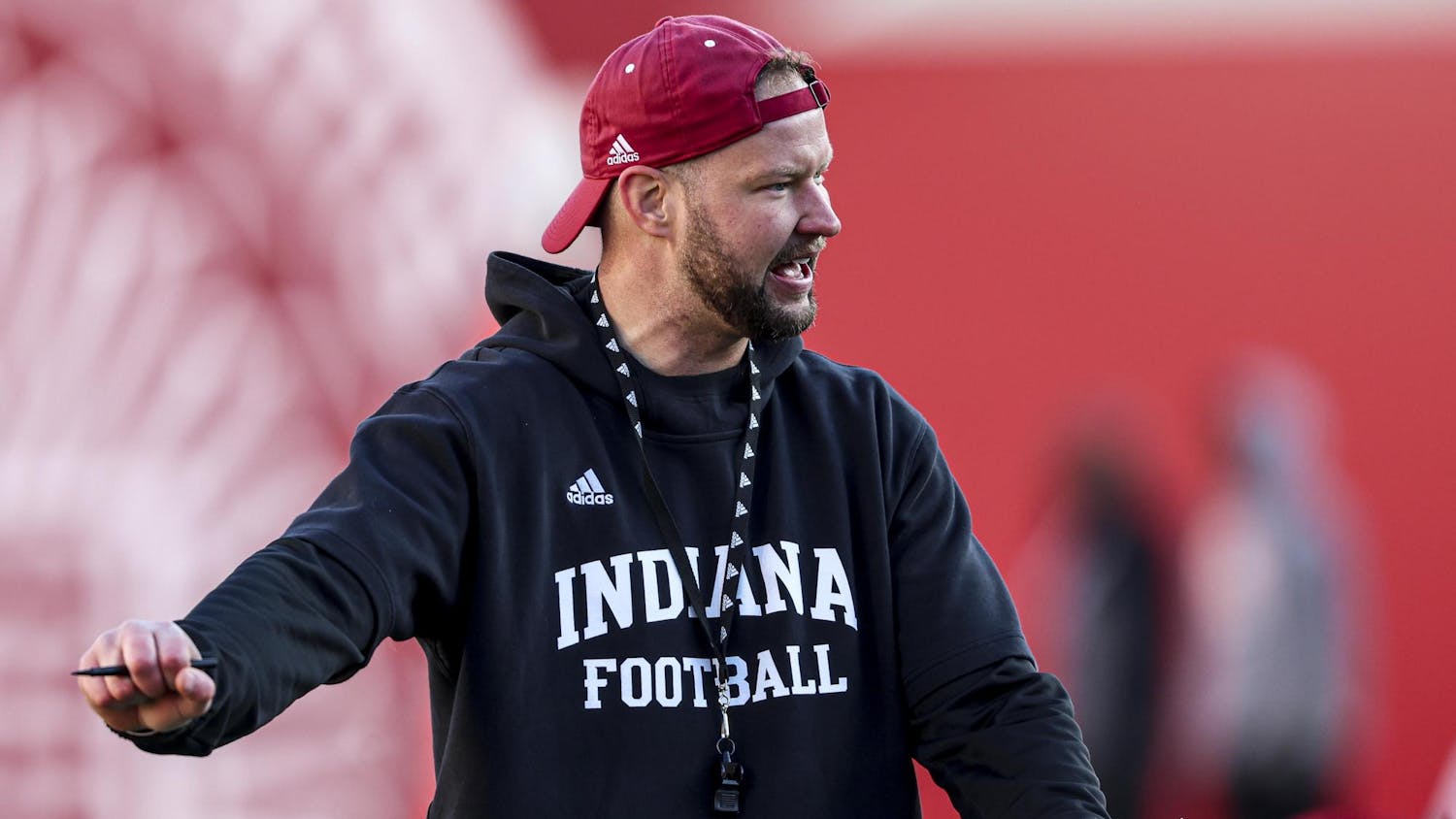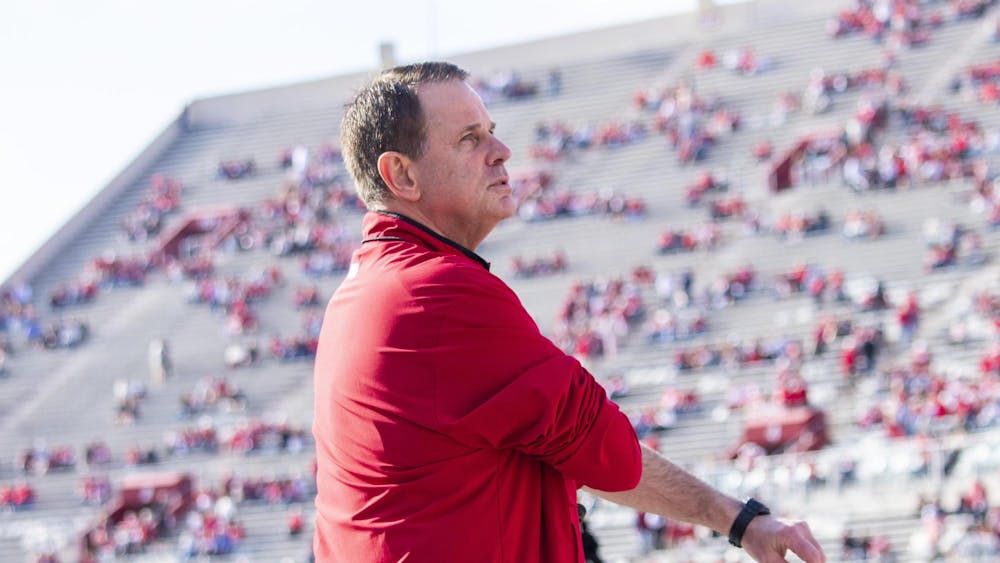Moss hails technology, affordability for students\nAttorney Jerry Moss comes to the Board of Trustees race well equipped with years of experience on various community and campus boards and foundations. \nThe 1958 graduate of the Kelley School of Business, who later moved on to receive his degree from the IU School of Law, currently serves as managing partner for the Indianapolis-based firm Bingham, Summers, Welsh and Spillman. \nHe has served on the IU Foundation board and the board of visitors at the IU School of Law. He has also served as president of both the IU Alumni Association and IU Varsity Club. The School of Law awarded him with its Distinguished Service Award as well.\nHis efforts have served the Indianapolis area as well; Moss has been president of the Washington Township School Foundation and served on the boards of the Greater Indianapolis Progress Committee, Indianapolis Symphony Orchestra and the Indianapolis Bar Foundation.\nHe feels three major issues facing the university are fiscal responsibility, affordability and retention and technological advancements. \nTo achieve the first goal, Moss said it's necessary to educate voters on the need for significant funding allocations toward higher education.\n"We must focus on fiscal responsibility to assure maximum return for available monies... to stimulate greater legislative awareness and action," Moss said. \nRetention is also a key fixture of Moss\' platform, a goal he intends to realize through maintain "the highest level of technology at all campuses as well as the highest quality staff." By building a learning environment in which teachers are rewarded for their research and instruction efforts, both faculty and students are encouraged to keep learning.\nHe feels trustees factor into the equation by forming close working relationships with the "total university community," consisting of students, faculty, alumni and staff, and recognizing inherent problems and providing possible solutions. \nTrustees also provide vision, Moss said. By establishing goals and standards, trustees can assist in providing the best possible education with the least financial burden. \n"My total IU experience as a student and an alumnus provide me with an understanding and appreciation for our tradition of excellence," Moss said. "We are not, however, without our concerns. I am deeply devoted to IU, and am prepared to work diligently to move our school forward."\nRichardson cites freshman retention as key issue\nIncumbent candidate Ray Richardson is prepared to defend his position on the Board of Trustees in the upcoming 2001-2002 election. Richardson has served on the Board for nearly ten years, and believes the results of his efforts have established him as a premier candidate for this year's race.\n"It\'s easy to become frustrated when trying to make changes, because before trustees implement changes, they are customarily submitted to the unwieldy faculty governance system for approval," Richardson said. "I\'ve learned to work with this system and get significant results — to solve problems that others just talk about."\nA 1962 IU graduate, Richardson has served on the University Policies Committee, Finance Committee, Strategic Directions Steering Committee, Bloomington Student Senate and on the board of the IU Alumni Association. He has also served the Indiana House of Representatives from 1966 to 1990 and was formerly the volunteer division chairman for fund drives by the American Heart Association. He also participates in American Cancer Society and United Way activities and is co-founder of a homeless shelter.\nA highlight of Richardson's career includes the creation of the Trustees Teaching Award, which recognizes IU's most outstanding faculty with monetary awards and grants. Most awards are based on excellence in research, Richardson said.\nHe also focused attention on monitoring faculty course loads, allowing all professors and assistant instructors to teach a fair proportion of classes. Additionally, a post-tenure review system has been implemented on the Bloomington campus designed to examine and assist faculty who fail to meet research and teaching expectations, Richardson said.\nRichardson said he plans to expand on programs already instated during his tenure on the Board and developed in cooperation with the Bloomington Faculty Council. Such initiatives include easier facilitation of transferring credits between IU campuses and establishing a training program enabling associate instructors to better teach undergraduate courses. \nHe believes a key plank of his platform includes the establishment of freshman retention programs on IU campuses with low graduation rates. Though Richardson acknowledges the Bloomington campus has an "excellent" graduation rate, these programs, which consist of supplemental instruction, tutors, academic communities, mentor programs and more in-depth academic advising, allow campuses with poor graduation rates to better retain underclassmen. \n"On all IU campuses outside of Bloomington the graduation rate is so low that we owe it to the students to help more of them get degrees," Richardson claimed. \nRichardson also believes faculty retention is a key to the well-being of all campuses. \n"While my efforts have gone primarily towards improving undergraduate teaching, the reputation of the Bloomington campus depends primarily on the research efforts of the faculty," he said. "The faculty, like students, must be retained, and since money is one of the important ingredients in doing that, it is important to make sure that funding is sufficient."\nShumate says faculty important for success\nAttorney and 1967 IU graduate Michael J. Shumate has come out of his retirement in Aspen, Colo. to assume his place in the board of trustees race. Stressing the importance of faculty, partnerships and diversity, Shumate feels he can devote his full attention to implementing successful programs to enrich those areas if elected.\nShumate was involved in the Sigma Chi fraternity while at IU and was president of his senior class. After graduation, Shumate attended the University of Virginia Law School, earning his J.D. in 1970. Still, he continued to serve the University on the board at the Kinsey Institute and the IU accounting department in the Kelley School of Business. He is now involved in the Indianapolis IU Alumni Club and has taught at IUPUI as well.\nShumate's legal career includes serving as administrative partner and on the management committee in the New York and Los Angeles offices of Jones Day Reavis and Pogue. He was also formerly the chairperson of the Indianapolis Human Rights Commission and belongs to the Indiana CPA Society and the Indiana, California and New York bar associations.\nShumate believes faculty are "the most important component of the university." The implications of that statement, he contends, means IU must attract and retain first-rate faculty by offering adequate financial compensation. He lauds open communication between faculty and administrators as crucial components as well.\nPartnerships are of additional importance, Shumate continued. \n"IU should develop more partnerships with outside entities such as the Indiana Genomics Initiative," he said. "Such partnerships assist IU to raise important funding; adapt its research to private-sector needs; stay abreast of new technologies and marketplace demands; and attract top faculty."\nAttracting and retaining students is also one of Shumate's primary goals. \n"Retention of students, especially in the crucial freshman year, is essential to ensure a broad base of diverse students," he said. \nIf elected, Shumate would work to develop inclusive programs designed to facilitate diversity on all IU campuses. Success in such programs has "unlimited benefits," he claimed. \n"Trustees have important fiduciary responsibilities to a number of constituencies, all of whom strive to enhance It's global reputation," Shumate said on the IU Alumni Association's Web site. "Trustees must provide the vision and leadership in this quest in an open, fair manner and remain accessible to their various constituencies"
Candidates vie for position on board of trustees
Get stories like this in your inbox
Subscribe





